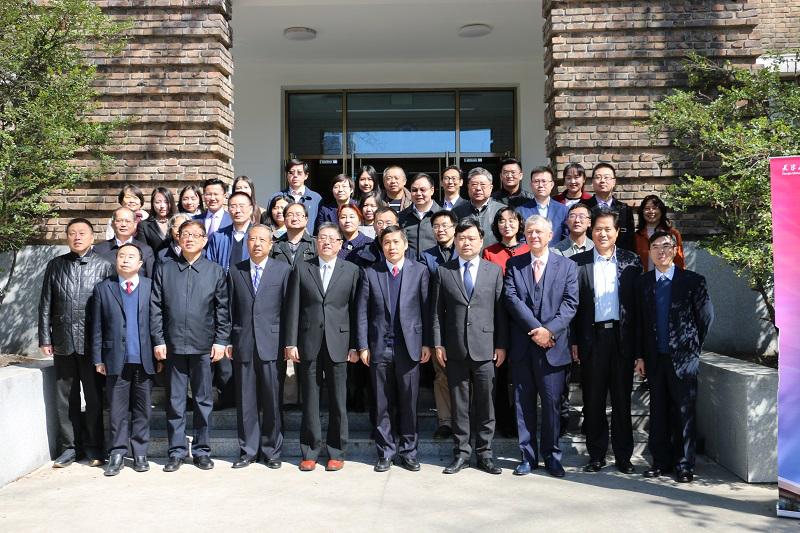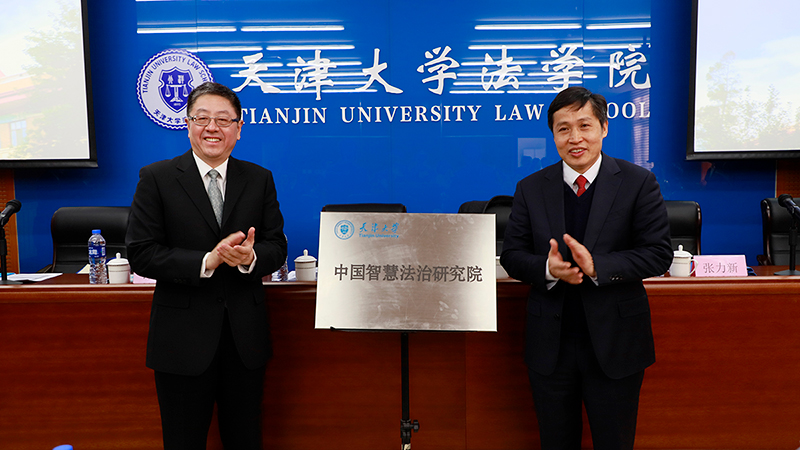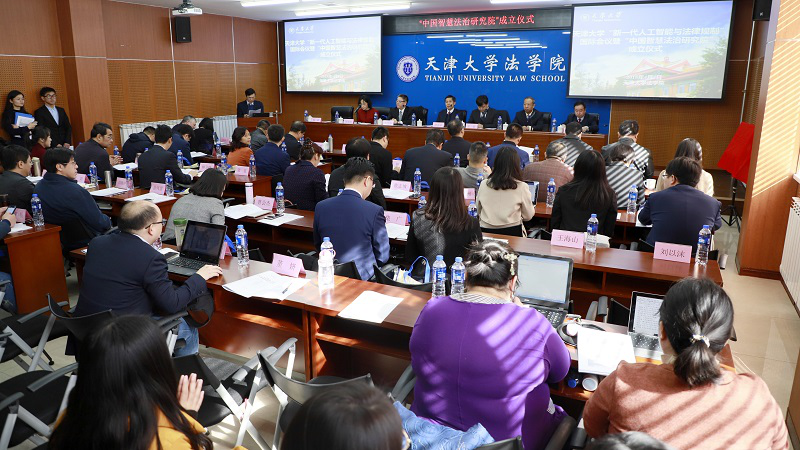
On April 7, 2018, Tianjin University held an international conference on the "new generation of artificial intelligence and legal regulation", and established the Institute for Artificial Intelligence and Rule of Law. Over 60 experts and scholars from governments, law firms and top universities of different countries attended the event.
Professor Sun Youhai, Dean of the Tianjin University Law School, revealed the development vision for the Institute. He pointed out that the establishment of the Institute, which is based on the requirement of the strategic vision of comprehensively advancing law-based governance, is a positive response to such strategies as "nurturing high-caliber modern talent", "constructing an internet power", and "big data". Focusing on the urgent problems coincident to the construction of a system for the rule of law, the Institute will conduct talent cultivation, legal theoretical research and make major technological breakthrough, and demonstrate applications through information technology, Internet technology, artificial intelligence and big data to obtain world-class advances, thus providing theoretical guidance and technological support for the cultivation of high-quality talent, the realization of scientific legislation, judicial justice for the people, and the establishment of a fair and transparent legal system. Tianjin University Law School has entered into collaboration agreements with other schools related to big data. It has also conducted extensive cooperation with international research institutes, the law academia, information and technology companies, and top universities such as New York University and Sydney University of Science and Technology, which can provide theoretical, information technological support for the core affairs of the intelligent rule of law. Future research of the Institute will focus on legal talent cultivation, basic scientific problems of intelligent administration of justice and artificial intelligence technology, key technologies and equipment of core affairs regarding intelligent courts, inspections, and administration of justice, synergy and knowledge support systems for intelligent administration of justice, and comprehensive application demonstration and effective evaluation of impartial judicature.
Wang Heng, General Manager of the China Justice Big Data Institute, and Professor Zhang Lixin, Assistant to the TJU President, signed the strategic cooperation agreement.

Zhong Denghua, an academician of the Chinese Academy of Engineering and President of Tianjin University, and Xu Jianfeng, Director of the Information Center of the Supreme People's Court, jointly unveiled the nameplate for the research institute.
Xu Jianfeng pointed out in his speech that artificial intelligence is an important part of informationization construction and a key technology for the future. In July 2017, the State Council issued the "development plan of a new generation of artificial intelligence", which means that China will vigorously develop artificial intelligence as a national strategy. Artificial intelligence is now extending to all corners of social production and people's life. However, we must recognize that artificial intelligence brings not only opportunities but also serious challenges. Discovering, studying and solving the problems in the development of artificial intelligence are definitely the missions of the era. Artificial intelligence has been widely used, and intelligent judicature is one of the important fields. Entering into the new era, for the purpose of comprehensively deepening the reform of the judicial system, realizing the modernization of the rule of law system and judicial capability, and enhancing justice for the people, it is necessary to embrace modern science and technology represented by artificial intelligence and integrate them with judicial activities, which is well represented by the construction of the “intelligent court”. The construction of the intelligent court was listed in “The Outline of the National Informatization Development Strategy” and “The Informatization Planning of the 13th Five-year Plan” in 2016, indicating that the intelligent court is not only closely related to the modernization of people's courts, but also has become an important component of national development strategy. After the third national court meeting on information technology, the courts at all levels began to promote the transformation and upgrading of informatization construction, and speed up the construction of Informatization 3.0 on the basis of Informatization 2.0 in accordance with requirements of the "Five-year Plan of Informatization Construction of the People's Court". The courts have made remarkable achievements in handling official business online, publishing the whole processes in accordance with the law, and providing comprehensive services. In the future, the construction of the intelligent court should be further advanced. In order to further improve the understanding of intelligent court for all courts around the country, as well as to guide the construction of intelligent courts at different levels, the Supreme People's Court issued the "Opinion on Speeding up the Construction of the Intelligent Court" as a guide for the construction of intelligent courts at present and in the future. The intelligent court will further enhance the trial system and modernize judgment capability, ensuring judicial justice and credibility, thus satisfying our people.
Zhong Denghua pointed out that artificial intelligence has set off a new wave of the industrial revolution in the world. In turn, the rapid growth of China's economy and the transformation and upgrading of industrial structures provide opportunities for artificial intelligence. Our country attaches great importance to the artificial intelligence industry and intelligent social governance. The 19th CPC Congress Reports clearly stated the concept of "promoting deep integration of internet, big data, artificial intelligence and the real economy", and “taking intelligent social governance as the target of the Government”. To perfect China's artificial intelligence industry, we urgently need to guarantee integrity of the law and systems. New social problems caused by artificial intelligence also need to be regulated by law. Therefore, it is an inevitable trend to carry out interdisciplinary research between law and other disciplines in artificial intelligence and promote exchanges and cooperation between production, learning and research. Conforming to the trend of the times, Tianjin University fully integrated internal resources and played on the strengths of traditional disciplines such as computers, network security, applied mathematics, etc. under the coordination of the Law School, and had now set up the Institute for Artificial Intelligence and Rule of Law, which is an important step for constructing a world class university and disciplines. The establishment of the Institute provides a new opportunity for the development of the Law School and the University. The teachers and students will have the opportunity to witness cooperation and interaction between science and technology and social governance in the near future, to acquire the latest data, as well as to make study more adaptive to the demands of the times and make research more targeted, thus ensuring that teaching and scientific research will better serve the construction of a powerful modern nation.

After the inauguration ceremony, the law experts and scholars were involved in a lively discussion on issues such as modern high-tech legal talent cultivation, artificial intelligence and intelligent rule of law practice, ethics and law regulation of artificial intelligence, artificial intelligence application and civil governance, international rule of law for artificial intelligence, automatic driving, among other topics.
By: Fan Songmei, Wang Kai
Editors: Sun Xiaofang and Ross Colquhoun






